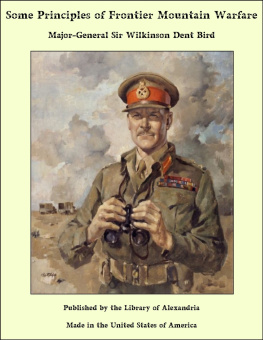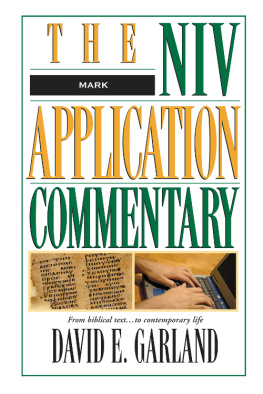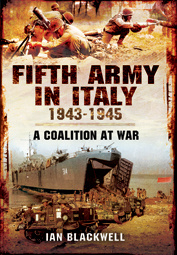
This edition is published by PICKLE PARTNERS PUBLISHINGwww.picklepartnerspublishing.com
To join our mailing list for new titles or for issues with our books picklepublishing@gmail.com
Or on Facebook
Text originally published in 2007 under the same title.
Pickle Partners Publishing 2014, all rights reserved. No part of this publication may be reproduced, stored in a retrieval system or transmitted by any means, electrical, mechanical or otherwise without the written permission of the copyright holder.
Publishers Note
Although in most cases we have retained the Authors original spelling and grammar to authentically reproduce the work of the Author and the original intent of such material, some additional notes and clarifications have been added for the modern readers benefit.
We have also made every effort to include all maps and illustrations of the original edition the limitations of formatting do not allow of including larger maps, we will upload as many of these maps as possible.
FROM SALERNO TO ROME: GENERAL MARK W. CLARK AND THE CHALLENGES OF COALITION WARFARE
by
GLENN L. KING, MAJOR, NEW ZEALAND ARMY
TABLE OF CONTENTS
Contents
TABLE OF CONTENTS
REQUEST FROM THE PUBLISHER
ABSTRACT
On 9 September 1943 the United States Fifth Army landed at Salerno, commencing a lengthy and costly campaign that would transit the Italian Peninsula. Lieutenant General Mark W. Clark commanded this army. His many supporters, including Winston Churchill and General Dwight D. Eisenhower, considered him a brilliant staff officer and trainer. His detractors, including General George S. Patton, considered him overly ambitious and self serving. Clark had been promoted ahead of many senior and experienced officers, some of whom were now his subordinate commanders within the Fifth Army. His army would come under the jurisdiction of the Fifteenth Army Group, a combined American- British Headquarters commanded by General Harold Alexander, an Englishmen. Clark would command a number of foreign troops, including the British X Corps, the New Zealand Corps and the French Expeditionary Corps. Throughout this campaign, Clark would face the complexities of coalition command, tactical in nature but with strategic consequences. This thesis contends that the command arrangements within Fifteenth Army Group, together with biased perceptions, greatly influenced the decision making of General Clark, an accomplished staff officer yet inexperienced army commander.
ACKNOWLEDGMENTS
First and foremost I am indebted to my wife Rose for her wonderful support and infectious encouragement, especially during the many long hours and sometimes frustrating moments. She endured many weekends where I was required to forgo family activities in order to keep this project on track. I could not have completed this without you.
Second, I would like to thank the research staff of the Fort Leavenworth Combined Arms Library who always assisted me in gathering the required research material.
Third, I wish to thank my committee: Dr Jerold Brown, Mr. Marilyn Pierce, and Mr. George Chandler, whose advice and guidance kept me focused and on the right track. I am grateful for all their efforts and support.
ACRONYMS
ACSAmerican Chiefs of Staff
AFHQAllied Force Headquarters
BCSBritish Chiefs of Staff
BEFBritish Expeditionary Force
CCSCombined Chiefs of Staff
GHQGeneral Headquarters
NZNew Zealand
USUnited States
CHAPTER 1 INTRODUCTION
The genesis for operations within the Mediterranean theatre occurred at the Casablanca conference in January 1943. President Franklin D. Roosevelt and Prime Minister Winston Churchill agreed that steps must be taken to remove Italy from the war, however no firm plans were developed to affect this aim. The Allied leaders met again in Washington in May 1943 and agreed to an invasion of Italy in order to knock Italy out of the war and tie down the maximum number of German forces. This invasion would occur after successful seizure of Sicily by a British and American Army Group. The task for planning the invasion of mainland Italy fell to the United States Fifth Army, commanded by Lieutenant General Mark W. Clark. General Clark was the youngest Lieutenant General in the American Army. Clark had gained a reputation as a very competent officer, but one who was overly ambitious and media savvy. Clark had very good relationships with people in positions of power that included Churchill and General Dwight D. Eisenhower. Other than a short period of command during the First World War, Clark had been the consummate staff officer. Clarks Fifth Army would come under the control of the Fifteenth Army Group, commanded by the British Officer General Harold Alexander. Alexander was highly regarded within the higher echelons of command, having gained vast experiences when commanding troops during the First World War and the inter-war period.
On 9 September 1943, Operation Avalanche commenced with the Fifth Army storming the beaches at Salerno. The American and British forces slowly made their way inland under intense enemy fire. Operating astride the Sele River, both the United States VI Corps and British X Corps needed to rapidly secure their common boundaries. After the first day, General Clark was pleased with the progress that had been made. Little did he know that this would be the start of an eight month struggle for his army? Clarks forces were to advance north through difficult terrain and defeat a capable enemy force fighting from a series of defensive lines. Lacking resources that had been set aside for the invasion of France amplified these difficulties. The human dimension would be a key factor throughout. The capabilities of a number of subordinate commanders would be scrutinized, and varying nationalistic views on the conduct of the campaign would soon surface.
The focus of this thesis is to determine the impact that command arrangements and styles within the Fifteenth Army Group, together with perceptions of other nations forces, had in influencing General Clarks decision making. The research will review the strategic and operational influences evident within the Mediterranean theater at the time. The careers of both Generals Clark and Alexander will be analyzed in order to identify both similarities and differences in the course of the respective careers. These experiences would be vital in shaping their respective command philosophies. Fifth Armys operations, from Operation Avalanche in September 1943 to the capture of Rome in June 1944, will provide the basis for which to analyze the actions of units and the respective commanders. Due to the length and complexity of this campaign, this thesis will focus on those key events that provide appropriate information for analysis.
CHAPTER 2 THE ITALIAN CAMPAIGN
Allied Strategy for the Mediterranean
On 14 January 1943 the second stage of Operation Saturn, a Soviet counter offensive against stalled German forces on the Eastern Front was approaching its second day. United States - led Allied forces were making significant progress in the Pacific Campaign. On this same date, delegations led by President Franklin D. Roosevelt, Prime Minister Winston Churchill, Generals Charles De Gaulle and Henri Giraud (figure 1) commenced a strategic planning conference at the Anfar Hotel in Casablanca, Morocco. This conference, to become known as the Casablanca Conference, Codename Symbol, would commence detailed planning and preparations for the next series of operations to commence within the European and Pacific theatres, noting in particular that Churchill stated that we have no (suitable) plan for 1943. {1} Originally intended to be a tripartite conference, Russian leader Joseph Stalin had declined the invitation to attend.











